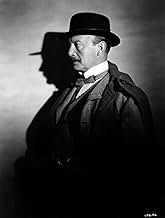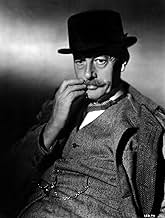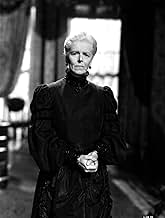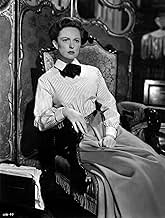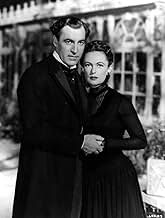After a sickly Victorian woman dies suddenly, a postmortem reveals that her body contains a fatal dose of arsenic. Suspicion falls on her husband and her companion, who are lovers. Inspector... Read allAfter a sickly Victorian woman dies suddenly, a postmortem reveals that her body contains a fatal dose of arsenic. Suspicion falls on her husband and her companion, who are lovers. Inspector Martin of Scotland Yard solves the mystery of her death, over a cup of tea.After a sickly Victorian woman dies suddenly, a postmortem reveals that her body contains a fatal dose of arsenic. Suspicion falls on her husband and her companion, who are lovers. Inspector Martin of Scotland Yard solves the mystery of her death, over a cup of tea.
Irene Arnaud
- Horace's wife
- (uncredited)
Frederick Kelsey
- Mr. Chudleigh
- (uncredited)
Ernest Metcalfe
- Cabbie
- (uncredited)
Sidney Monckton
- Horace
- (uncredited)
Featured reviews
Suspicion falls on widower David Farrar and his pert young mistress (Geraldine Fitzgerald) when his sickly, shrewish wife dies of arsenic poisoning. Veteran director Maurice Elvey creates a nicely ominous atmosphere as the ghostly influence of the dead woman seems to pit the lovers against one another, but the middle act, in which Farrar and Fitzgerald grow increasingly suspicious of the other's possible motive for murder, tends to drag. Roland Culver as a dogged, no-nonsense Scotland Yard detective livens things up considerably.
This rather claustrophobic British mystery opens on the death of a chronically ill woman, Edwina Black during Victorian/Edwardian times. She is a wealthy woman, and leaves behind a large estate. We quickly learn that Edwina's widower, Gregory, and Edwina's companion, Elizabeth (Geraldine Fitzgerald) are lovers and plan to sell the house and move to London as soon as possible, marry, and honeymoon in Venice. Both Gregory and Elizabeth have no money of their own. There is also a housekeeper/nurse who has been with Edwina for years who sees what Gregory and Elizabeth have been up to, and is suspicious of their involvement in Edwina's death. Soon her suspicions have her wagging her tongue to the village folks, and Scotland Yard is brought in to investigate Edwina's death. Post mortem shows she died of arsenic poisoning, not the heart attack originally thought to be the cause of death. And so the. Inspector (Roland Culver) begins digging, and Gregory and Elizabeth are stuck there in this dark house full of bad memories until the investigation is over.
This film is rather claustrophobic, with almost all of the action taking place in the large Black estate. You never actually SEE Edwina. The short time she was alive she was behind the door of her bedroom. So all we know about her we get from listening to the three people who lived with her. From the beginning Elizabeth has felt Edwina is haunting the house, looking for a way to get back at them. And on top of it all, now both Gregory and Elizabeth are wondering if the other actually did poison Edwina, and would they be next if the actual murderer wanted to hang the killing on them.
Roland Culver is very good as the inspector. Where do all of these British films come up with such thorough cops with nerves of steel and great observation powers? For once, this is a film that works for Geraldine Fitzgerald. I never felt that Warner Brothers quite knew what to do with her. I'd recommend it.
This film is rather claustrophobic, with almost all of the action taking place in the large Black estate. You never actually SEE Edwina. The short time she was alive she was behind the door of her bedroom. So all we know about her we get from listening to the three people who lived with her. From the beginning Elizabeth has felt Edwina is haunting the house, looking for a way to get back at them. And on top of it all, now both Gregory and Elizabeth are wondering if the other actually did poison Edwina, and would they be next if the actual murderer wanted to hang the killing on them.
Roland Culver is very good as the inspector. Where do all of these British films come up with such thorough cops with nerves of steel and great observation powers? For once, this is a film that works for Geraldine Fitzgerald. I never felt that Warner Brothers quite knew what to do with her. I'd recommend it.
This is a fine thriller well acted and directed.Jean Cadell does a fine job of scaring the life out of everyone.Veteran director Maurice Elvey does a fine job of sustaining suspense despite the fact that there are only three suspects.Roland Culver is the diligent detective who bit by bit manages to deduce what happened and whodunnit.The ending is a bit of a surprise.
"The Late Edwina Black" from 1951 stars Geraldine Fitzgerald, a favorite of mine, and David Farrar.
The story takes place in Victorian England. Gregory, Edwina Black's husband, is a schoolteacher. Edwina herself seems to be an invalid and independently wealthy. Her companion from childhood is Ellen (Jean Cadell).
The other person helping with Mrs. Black is Elizabeth. Elizabeth happens to be in love with Gregory, and he with her, and Ellen knows it.
One day Mrs. Black is found dead, and while at first it seems like a heart attack, it appears she was poisoned. A police inspector (Roland Culver) comes around as soon as it is learned how Mrs. Black died. His questions annoy Gregory and upset Edwina.
Before you know it, the two of them are suspecting one another. Elizabeth believes Edwina's spirit is still present and trying to destroy both of them.
Good movie, good mystery, with fine acting. It really does keep you wondering. The atmosphere is terrific, mostly inside a big, dark, gloomy house, which is perfect for the plot.
David Farrar was quite handsome but, like Dirk Bogarde before him, just wasn't cut out for Hollywood. While Bogarde's career in Europe continued and expanded after Hollywood, Farrar could not regain his momentum. He finally retired. Recommended.
The story takes place in Victorian England. Gregory, Edwina Black's husband, is a schoolteacher. Edwina herself seems to be an invalid and independently wealthy. Her companion from childhood is Ellen (Jean Cadell).
The other person helping with Mrs. Black is Elizabeth. Elizabeth happens to be in love with Gregory, and he with her, and Ellen knows it.
One day Mrs. Black is found dead, and while at first it seems like a heart attack, it appears she was poisoned. A police inspector (Roland Culver) comes around as soon as it is learned how Mrs. Black died. His questions annoy Gregory and upset Edwina.
Before you know it, the two of them are suspecting one another. Elizabeth believes Edwina's spirit is still present and trying to destroy both of them.
Good movie, good mystery, with fine acting. It really does keep you wondering. The atmosphere is terrific, mostly inside a big, dark, gloomy house, which is perfect for the plot.
David Farrar was quite handsome but, like Dirk Bogarde before him, just wasn't cut out for Hollywood. While Bogarde's career in Europe continued and expanded after Hollywood, Farrar could not regain his momentum. He finally retired. Recommended.
"The Late Edwina Black" is a most unusual murder mystery because instead of focusing on the accused, it focuses on three people and you see how they react to the possibility that the others are killers. Because of this, it's a great look at human nature at all its worst!
The story begins with Mrs. Black being found dead. Following her funeral, a police inspector shows up...indicating that there might have been foul play and he was having the body exhumed. It turns out that the lady's body was full of arsenic....and the remaining 80% of the film consists of the members of the household reacting to this.
The acting is very good in this one and the story quite good. My only quibble is the ending...I really think leaving it more vague would have been much more interesting following the inspector's revelation. Still, well worth seeing and fascinating throughout.
The story begins with Mrs. Black being found dead. Following her funeral, a police inspector shows up...indicating that there might have been foul play and he was having the body exhumed. It turns out that the lady's body was full of arsenic....and the remaining 80% of the film consists of the members of the household reacting to this.
The acting is very good in this one and the story quite good. My only quibble is the ending...I really think leaving it more vague would have been much more interesting following the inspector's revelation. Still, well worth seeing and fascinating throughout.
Did you know
- TriviaAfter opening in England in 1949, the original play had a short-lived run at the Booth Theatre, New York, starring Signe Hasso from November 21 to December 2 1950.
- GoofsGregory and Elizabeth get carried the way by the thought of a splendid dinner. They lay the dining-room table using fine cutlery, china and glassware, and change into formal clothes. However, there is no-one to cook the meal for them and they do nothing to prepare it themselves.
- ConnectionsVersion of Matinee Theatre: Edwina Black (1956)
- How long is Obsessed?Powered by Alexa
Details
- Release date
- Country of origin
- Language
- Also known as
- The Late Edwina Black
- Filming locations
- Worton Hall, Isleworth, Middlesex, England, UK(House exteriors)
- Production companies
- See more company credits at IMDbPro
- Runtime
- 1h 18m(78 min)
- Color
- Aspect ratio
- 1.37 : 1
Contribute to this page
Suggest an edit or add missing content

